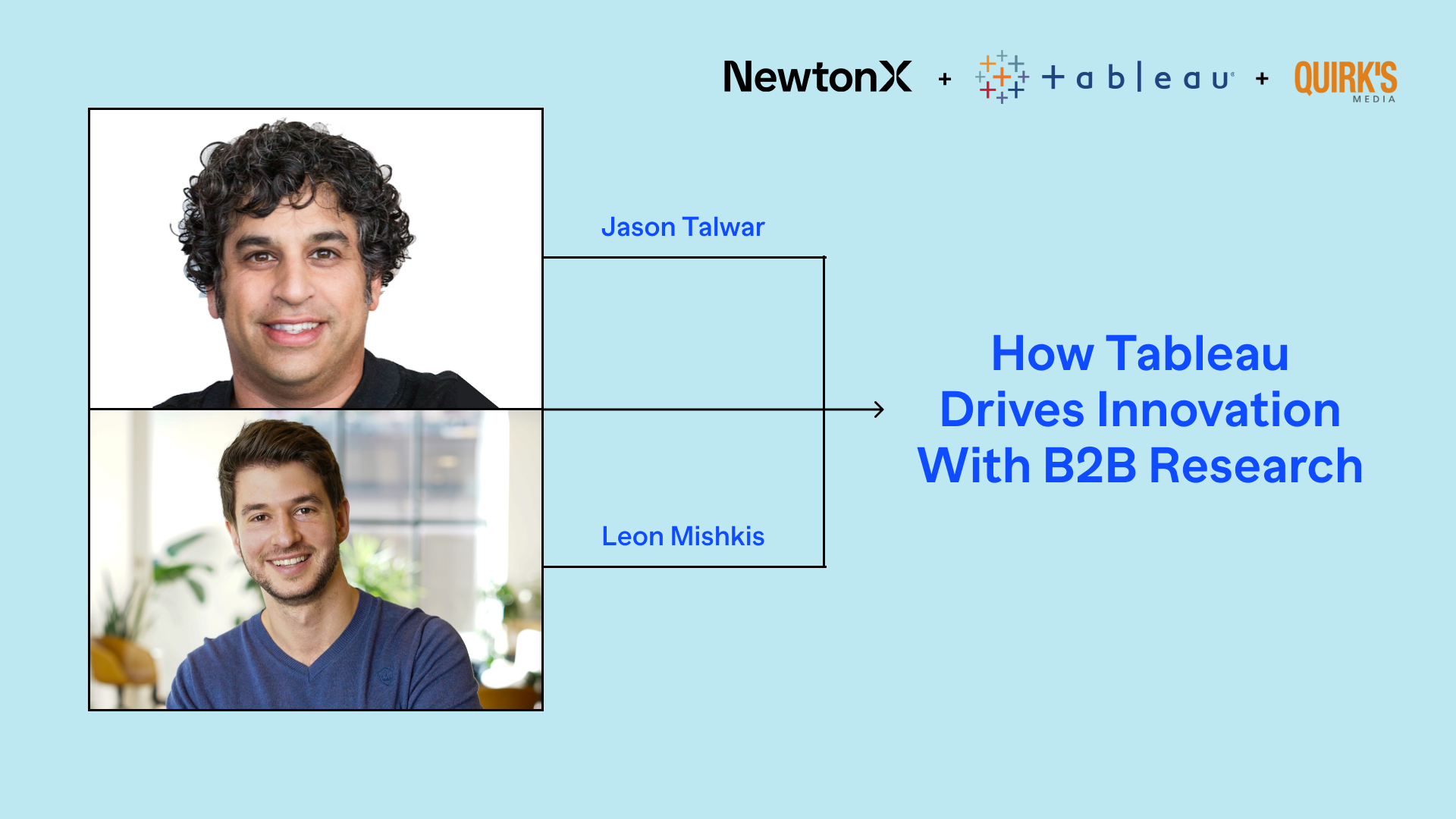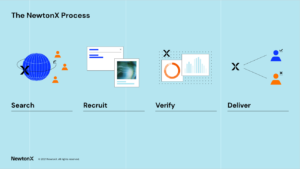[Webinar Recap] Tableau’s New Approach to B2B Research and How It’s Driving Innovation

Deep dive on Custom Recruiting, a new B2B research methodology, and how it delivered the exact insights Tableau needed.
Does the thought of bad data keep you up at night? As your organization gathers insights to guide multi-million dollar decisions, how are you ensuring that the data is reliable and free from fraud?
In this session, Jason Talwar, Head of Market Insights and Research at Tableau, and Leon Mishkis, COO of NewtonX, will share how to create a data-first company culture. Learn how market intelligence and customer feedback is leveraged to fuel Tableau’s consistent growth and innovation in Business Intelligence and Analytics.
Don’t have time to watch? Catch the key takeaways below:
- What are the goals of research at Tableau? What are the biggest challenges Tableau faces with B2B research?
- How has Tableau found success with the Custom Recruiting approach compared with traditional expert panels?
- How does good data improve organizational data culture and internal discussions across stakeholders?
- How do you streamline operations so you can invest in 100% verified samples?
What are the goals of research at Tableau? What are the biggest challenges Tableau faces with B2B research?
Jason Talwar: I want to give our stakeholders the best possible data to make the best possible decisions. We live in a highly competitive environment, and any intelligence that we gather will feed into our strategy.
So if I’m not confident in the data, then I don’t want to be sharing it with my stakeholders. That’s happened a few times — where I’ve seen a research study and said, no, we just can’t share this. And we sometimes have to throw it out.
For example, if we were to spend $50K on a study and we used a poor sample, then that study will actually net us zero. Nothing to be gained. I would argue that it takes us more time and resources to execute on that data. But in the end we may be losing more money, right? Because if we go on this false strategy based on false data, the opportunity cost is much greater.
Partnering with NewtonX allows us to better service our stakeholders — so they can trust the data and develop strategy with it.
Jason Talwar
Head of Market Insights and Research at Tableau, Salesforce
Whereas when we use a verifiable sample — when we know who these people are — when we partner with NewtonX, our risk goes way down. And when that risk goes down, I feel more confident sharing that data, knowing that’ll read to more positive, measurable outcomes and build into our strategy. Before we connected with NewtonX, we tried many different suppliers and all ended up with the same poor results. As part of this study, we did a naming exercise relaunch one of our new products. And the research from this went right up to our Tableau executive teams to help name our new product.
How has Tableau found success with the Custom Recruiting approach compared with traditional expert panels?
Jason: One of the pain points from working with traditional panel providers is not being able to hit our targets. Or in the beginning of the conversation, they’ll say they’re confident they can, but in the end, we’re not really filling the quotas. Or, we’re getting people who say they’re decision makers, but they’re not.
With Custom Recruiting, we were able to fill the quotas. No problem. We didn’t have to make any sacrifices on, “oh, can we find this person? Or can we find that person that does this role?” We get really, really, really specific. Sometimes if we’re looking at much larger organizations with someone sitting in a single department, it makes it really difficult.

Leon: Absolutely. This is also where Custom Recruiting goes hand in hand with quality control. We believe custom recruiting compared to a panel increases the quality quite significantly, because if you have a closed panel with what we call survey takers — people that are just chasing the next quick opportunity to make a few dollars, and that are trained to give exactly the survey answers that you’re used to — those panels are extremely biased. Whereas when you custom recruit professionals who are participating in a survey for the first time, they are much less biased. They’re coming from a much bigger pool. They’re not focused on doing market research on a regular basis, which means they’re giving better answers than what we see in a closed panel approach.
Our targeting ability is also key. Again, the more targeted our expert outreach is, the higher quality people we are getting in. Our high incidence rates prove we are only reaching out to exactly the right audience, because we correctly translate your requirements into specific search parameters to ensure that we get you these right people. And of course, we have the screener. We also verify all respondents to triple check that these people are exactly who they say they are, which prevents fraud.
How does good data improve organizational data culture and internal discussions across stakeholders?
Jason: Living in a data culture means putting myself out on the line. Sometimes you have to bite the bullet and say, some of this is not good data. We didn’t get the ROI we’re expecting. But moving forward, this is something that I no longer have to worry about when working with NewtonX and the custom recruiting model. I’m very collaborative with my stakeholders to begin with, and now with better data, it reframes how they look at the research.
Good data also helps our stakeholders internalize the research. We try to educate our stakeholders with ideas developed by my manager, Charles Schaefer, our Senior Director of Market Research. For example, taking our research and sharing it with our folks in quick bites so they can understand the methodologies and ask questions. It may or may not be relevant to them, but at least it gets them engaged with the research. And then that leads into, “Hey, I’ve got some ideas for research, Jason – how can we partner up?”
Living in a data culture means putting myself out on the line. Now with better data, it rebuilds trust and reframes how our stakeholders look at the research.
Jason Talwar
How do you streamline operations so you can invest in 100% verified samples?
Jason: We have to get scrappy right too. How do we make our operations easier internally on our research so that we can pay for a high quality sample? Greg Timpany, Researcher on my team, has been really instrumental in our quality control here at Tableau. And given the way we structure our team, we know how to develop surveys. We know our industry, we know our survey, we know how to do the analytics. We know how to write the report. And we’re able to at cut costs to be able to get a good study.
It’s about value and the cost-benefit analysis. When I go and I talk to sample providers who quote 45 or 50 bucks a complete for what our target is — and we’re targeting executives that are VP plus level in enterprise organizations — even my gut check is like, maybe some of these folks are not right. That’s not worth their time. Like they’re not out there signing up on panels, you know, to take surveys if they’re working in these companies.
Leon: Absolutely. We’ve been doing a ton of C-suite research on CSO, CIO, CTOs, and CFOs. And you can’t tell me any one of them would ever take a survey for $10. At NewtonX, we pay professionals fairly for the value of their time, which ensures that they’re spending the effort to provide you with insightful data.
Jason: It was also good to know that your NewtonX team provided full service research — not just the sample, but also the end-to-end market research service. It was really seamless to work with just one company to get these things out like the analysis and report, in addition to getting the insights.
I felt confident on the data that we didn’t have to really make excuses as to, “hey, the qual didn’t match the quant, or why is this showing up when it really shouldn’t show up?” It was really seamless. And we’re really confident in terms of what we were sharing internally. So overall, it’s been a great experience working with NewtonX B2B market research agency, and we’re looking forward to partnering on future studies.
Sign up for our newsletter, NewtonX Insights:
Related Content
[Webinar Recap] Building Strategic Research Partnerships: How Microsoft and NewtonX Source Critical Business Insights
NewtonX and Microsoft share 4 takeaways to drive research success through collaborative client-vendor partnerships.
read more[Webinar Replay] B2B Innovations: Research Methodology that Transformed UX at Pinterest
Watch B2B Innovations: Research Methodology that Transformed UX at Pinterest, NewtonX's newest webinar hosted by Greenbook.
read more[Webinar Replay] NewtonX Current: What CFOs really think about the future of work
Building off the learnings of the report, we're hosting a 45-minute webinar to get to the bottom of what CFOs really think about the return and future of work.
read more[Webinar] B2B Research Trends: How can insights leaders drive more impact in 2023?
Volatility in the market can cause enterprise leaders to hesitate when making strategic decisions. Do you have the right data? What are the consequences of making the wrong decision? According to GreenBook’s most recent
read more[Webinar] Masterclass: How to actually apply AI to the business
Join Jason Talwar, Patiwat Panurach, and Vicky Gu to learn how to design questions and interpret data on emerging technology—for maximum business impact.
read more[Webinar] The new product research framework making waves in the Fortune 500
Leon Mishkis, COO at NewtonX, shares key insights on futureproofing your product strategy with the 5-stage Product Research Lifecycle.
read moreHow Tableau utilized a NewtonX brand tracker to sustain innovation
Tableau empowers enterprises to drive change with data. They came to NewtonX to design a brand tracker with input from senior IT and business decision makers to inform product strategy.
read more